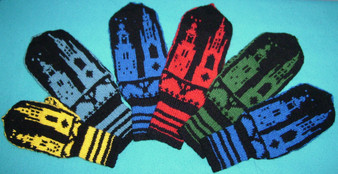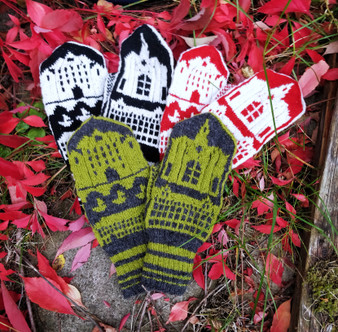Product Description
These two-color mittens where loops are created on the inside with each color change, a layer-upon-layer effect is created where warm air is kept in the small, natural pockets made by the loops, making it warm and cozy even on the coldest of days. Also, a knitted wool mitten will not get cold as fast when wet as a mitten of fabric when wet. These mittens are also washable on the wool program of your washing machine – just remember that they need to air-dry! No dryers etc.
The story behind the design:
In 1588, King Johan III issued an interim privilege that would be valid for six years to build a city in Västerbotten. The idea was that the city would lie on the rectory in Backen, where both the parish church and the Umeå royal court were located. There were also more or less accessible roads from all parts of the parish, and annual Lapp markets were held there with the Sami people in the region. There was also a port in Ume River and the country merchants lived largely in villages near the parish church. During the 1590s, however, the attempt to create a city died out, partly because the water level in the Ume River fell so much that larger ships could no longer travel all the way.
In 1617 Gustav II Adolf was crowned, and he wanted to make another attempt to build a city here. Four years later, a royal commission ordered that a new town be built on the north riverbank, five kilometers further downstream from the original town. In 1622, Umeå received new city privileges, this time also interim privileges. It took until 1646 before Umeå received permanent city privileges, issued by Queen Kristina. The year 1622 is what is reflected in the stripes of the pattern color, where each turn corresponds to the year when Umeå first received its city privileges; 1-6-2-2.
Mitten motifs:
At the bottom of the upper right side of the mitten is Umeå City Hall, built 1894–1901, and originally the barracks for Norrland's Dragoon Regiment K8. Above the town hall is the Umeå's landscape bird, the Eurasian curlew. At the top is Nyströms Bilkarosseri. Gösta Nyström started a carpentry business in Umeå in 1929 and delivered the first wooden car cabin the following year. During the 1940s, the first cab was produced in sheet steel, and in 1964 the company was bought up and renamed Volvo Umeverken. Today the company goes by the name Volvo Lastvagnar and is a Swedish subsidiary of the Volvo Group.
On the inside of the right mitten, there is a knitted year at the bottom, which could for example be the year the mitten was knit, or another year of importance to you. Maybe it's a gift for someone's birthday? Then you can instead use the year in which they were born.
Above the year is a writing quill, which symbolizes that since 2007 Umeå has organized Sweden's largest literature festival. At the top of the inside of the right mitten is a skier, which symbolizes that Umeå has been crowned Sweden's best sports city in 2018, 2020, and 2021.
The right thumb has a saxophone on the outside, to mark the Umeå jazz festival that was founded and organized since 1968. The festival has also had many international visitors, such as Dexter Gordon, Duke Ellington, Ella Fitzgerald, Count Basie, Sarah Vaughn, and Miles Davis. On the inside of the right thumb, the theme of music festivals continues with two notes, to mark all music festivals organized in Umeå.
On the upper side of the left mitten is the Umeå county residence at the bottom. In 1888, work began on drawing up drawings for a new residence, after the old one burned down during the great city fire in Umeå earlier that year. The building was completed in 1894. In 1934 two wings were added to have more space. The building is managed by Statens Byggnadsverk and was designated as a cultural monument in 1974.
On the middle of the upper side of the left mitten are three leaves, inspired by Stig Lindberg's design 'Berså', a very well-known Swedish design on various types of porcelain. At the top of the upper left mitten is the Umeå city church, which is a three-nave hall church in neo-Gothic style. The church was built in the years 1892–94.
On the inside of the left mitten, we have the same year at the bottom as on the right-hand mitten, and just above this one of the reindeer from Umeå's municipal coat of arms, which is decorated with three reindeer. At the top, the inside of the mitten is decorated with birch leaves, as Umeå is known as the 'city of birches'. Umeå was called this after a city fire in the summer of 1888, where large parts of the city were destroyed. To prevent future fires from spreading in the same way, wide esplanades were then laid out as fire protection and birch trees were planted along them so that fires could not spread as easily in the future.
On the outside of the left thumb there is a log hook, to mark the log rafting that was done for many years in the Vindel and Ume rivers. The glass artwork 'Green fire' by Vicke Lindstrand is depicted on the inside of the thumb. Lindstrand was known for his glass works, and the 9-meter-high glass artwork can be seen at Järnvägstorget outside Umeå central station.
Size: One size (spacious)
Measurements: (Cuff not included) Approx. 20x12cm / 8x4.8”
Yarn: Visjögarn or Rauma finull, or an equivalent 2-ply wool yarn with approx. 164 yd/50 g.
Gauge: 30 stitches x 40 rows = 4x4 inches.
Yardage: 164 yd of each color for all sizes.
Needle size: 2 mm and 2.5 mm


















